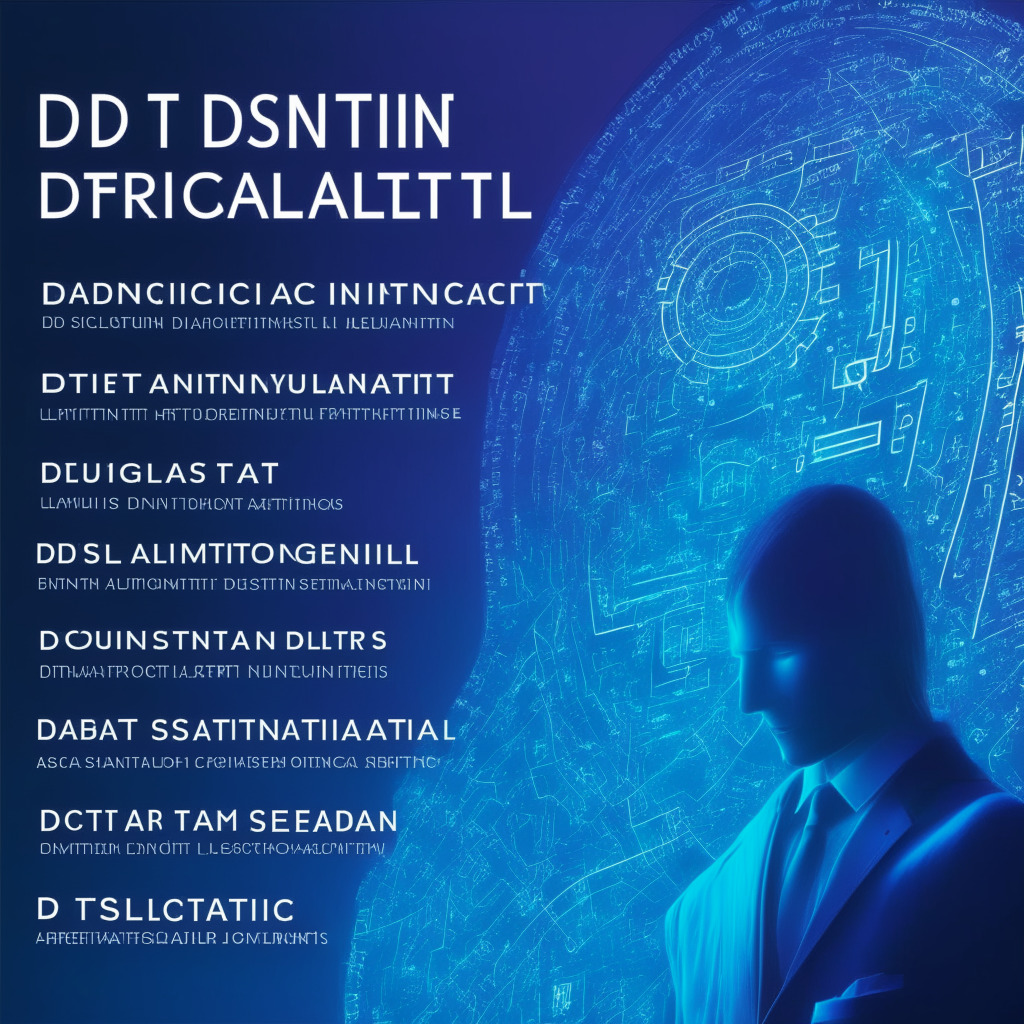Israeli authorities seized 190 Binance accounts linked to terrorists, including two connected to ISIS and one to Hamas. Binance faces scrutiny while facing challenges in the US. This situation raises questions about the role of crypto exchanges in geopolitical disputes and highlights the need for a balanced regulatory framework.
Month: May 2023
Pepe Coin’s Explosive Growth: Assessing Risks, Whale Dominance, and Futures Trading Impact
Pepe coin (PEPE) has seen astounding growth, appreciating by approximately 500% in two weeks. However, concerns about potential collapse due to dominant whale investors have led to increased short interest among futures traders, intensifying market risks and showcasing the importance of staying cautious in the volatile crypto world.
The Great AI Debate: Balancing Innovation, Risks, and Collaborative Safeguards
The meeting between U.S. Vice President Kamala Harris, President Biden’s advisors, and AI industry CEOs discussed potential risks posed by AI technology, emphasizing shared responsibility between governments and companies in risk mitigation. Topics covered transparency, safety evaluation, and protection from malicious actors. The Biden Administration allocated $140 million to National AI Research Institutes, and White House plans to release a draft policy on government usage of AI.
Coinbase Defies Expectations Despite Challenges: Analyzing Q1 2023 Results and Future Outlook
Coinbase Global reported a lower-than-expected quarterly loss of $79 million in Q1 2023 amid ongoing regulatory challenges and a dwindling customer base. The company curbed losses by reducing operating expenses and downsizing its workforce, despite a decline in retail trading activity and revenue dip due to high platform fees.
Brazilian-Argentine Alliance: How Blockchain Can Revive Economic Partnerships and Bypass IMF
Brazilian President Luiz Inacio Lula da Silva aims to facilitate economic assistance to Argentina amidst its financial crisis by serving as a liaison with the BRICS bloc, and also discusses establishing a direct credit line for Brazilian exports to Argentina.
Coinbase CEO’s Confidence in US Crypto Regulations Amid SEC Concerns
Coinbase CEO Brian Armstrong reassures investors of their commitment to the U.S. market despite regulatory uncertainty, expressing optimism about upcoming crypto legislation. However, he shares concerns about unpredictable enforcement action by the Securities Exchange Commission while highlighting progress in EU crypto regulation.
Terraform Labs Lawsuit: Examining International Crypto Regulation & Investor Protection Dilemmas
Terraform Labs faces a class action lawsuit alleging the sale of unregistered securities and misleading investors, while the company argues U.S. federal securities laws don’t apply. This case highlights the complexity of the blockchain landscape and the challenges in regulating an industry that transcends geographical borders.
ECB Rate Hike: Balancing Inflation Control & Economic Growth Consequences
The European Central Bank’s (ECB) recent decision to raise key interest rates generated mixed opinions, with concerns about persistently high inflation in the euro area. This stance by the ECB shows their priority to control inflation risks over dampening economic growth, emphasizing their commitment to achieving a 2% inflation target while considering potential consequences for the broader economy.
Thwarting Rogue Insider Rug Pulls: Lessons from the Merlin DEX Debacle
Smart contract auditor CertiK blocked $160,000 from Merlin DEX during a “rug pull” incident that cost users $1.8 million. Despite complications and lack of cooperation, CertiK committed $2 million to combating exit scams and recovering user funds. This highlights the need for stricter security measures, robust auditing, and increased transparency within the crypto space.
Israeli Crypto Seizures: Binance Accounts Linked to Terrorism and AML Policy Concerns
Israeli authorities seized around 190 Binance accounts linked to terrorist organizations such as Hamas and Daesh since 2021. The confiscations highlight concerns about the effectiveness of anti-money laundering measures taken by platforms like Binance and emphasize the need for stronger policies, transparency, and collaboration between authorities and crypto exchanges to ensure user safety from illicit activities.
Kenya’s Crypto Tax Debate: Official Recognition or Targeted Harassment?
Kenya’s lawmakers propose a 3% tax on cryptocurrency transfers and non-fungible tokens (NFTs), and a 15% tax on monetized digital content. While some perceive this as official recognition for cryptocurrencies and NFTs, others express concern over targeted harassment or unreasonable taxes.
Iran’s Move to Join BRICS: Opportunities, Challenges, and Global Power Shift Dynamics
Iran’s move to join BRICS and create a multipolar world presents opportunities and challenges for global financial markets, digital currencies, and blockchain adoption. This shift signifies changing global power dynamics and pushes towards a more balanced and inclusive world order.
Meme Coins Rise, Crypto Giants Fall: Mixed Market Signals and the Brewing CBDC Political Storm
As the crypto market experiences mixed signals with meme coins surging and crypto giants faltering, political debates over Central Bank Digital Currencies (CBDCs) intensify. Florida and North Carolina vote to ban CBDCs, raising concerns about state-chartered banks’ autonomy and potential federal government overreach in money regulation.
Bankrupt Voyager’s Liquidation Plan: Relief for Creditors Amid Binance.US Deal Fallout
Creditors of bankrupt crypto broker Voyager Digital may see relief as the firm approaches the final stages of bankruptcy liquidation procedures. After Binance.US backed out of a $1.02 billion deal to purchase Voyager’s assets, the broker can now pursue self-liquidation and distribute assets to customers via the Voyager platform.
Coinbase Q1 2023: Narrowed Losses, Robust Earnings, and the Quest for Regulatory Clarity
In Q1 2023, Coinbase significantly reduced its net loss to $79 million, partly due to a 22% revenue increase to $736 million spurred by strong retail investor trading activity. This performance led to a 7% spike in Coinbase’s share price, marking a potential turning point for the company as it focuses on cost reduction, operational excellence, and regulatory clarity, despite ongoing challenges from the SEC.
Kenya’s 3% Digital Asset Tax Proposal: A Step Forward or A Hindrance to Crypto Adoption?
Kenya’s Finance Ministry proposed a 3% tax on digital asset transfers, hinting at a trend of taxing cryptocurrencies without formal regulation. This arises amid increased global adoption, highlighting the need for clear regulatory frameworks to ensure market stability, investor protection, and encourage blockchain industry growth.
Nigeria’s National Blockchain Policy: Economic Leapfrog or Cryptocurrency Oversight?
Nigeria’s Federal Ministry of Communications and Digital Economy has approved the National Blockchain Policy, emphasizing the country’s interest in digital innovation. This move aims to benefit public and private sectors, reduce reliance on oil and gas, and align with the ‘DIGITAL NIGERIA’ Roadmap for a secure transaction environment. Despite promising outlook, skepticism remains regarding the integration of blockchain technology without significant attention to cryptocurrencies.
El Salvador Eliminates Tech Taxes: Economic Boost or Crypto Risk Magnet?
El Salvador’s President Nayib Bukele has signed a law eliminating taxes on technology innovations, AI, software, and hardware manufacturing. The country hopes to attract new tech investments and become an innovation hub while balancing the risks of cryptocurrencies and increased energy consumption.
Binance LaunchPools Frenzy: Sui Token Craze vs Regulatory Caution in Crypto Landscape
The Binance LaunchPools event, featuring Sui tokens, raised $300 million and saw a retail frenzy reaching $3.8 billion. Meanwhile, meme cryptocurrency PEPE’s market cap surpassed $550 million, highlighting hype-driven investments. As the crypto landscape evolves, striking a balance between enthusiasm, caution, and regulatory compliance is crucial.
Bullish Bitcoin Outlook after Fed Rate Hike: Analyzing Market Reactions and Challenges Ahead
Santiment reveals a bullish perspective on Bitcoin after the Federal Reserve’s recent rate hike, citing Bitcoin’s diminishing correlation with equities. Juxtaposing this with Bitcoin’s increasing correlation with gold, the analysis highlights potential growth for the leading cryptocurrency but advises caution due to broader market challenges.
Bitcoin Stability amid Banking Crisis: Safe-Haven Potential or Regulatory Uncertainty?
Bitcoin remains stable near $29,000 as investors weigh interest rate increases, banking crisis, and regulatory uncertainty. Its resilience during economic turmoil showcases potential as a long-term investment and safe-haven asset amid market disruptions.
Consensus 2023 Recap: Crypto Regulation, Election Impact, and Financial Milestones
The Consensus 2023 conference and Congressional hearings discussed critical cryptocurrency issues, including policy developments and the unclear delineation between securities and commodities. Upcoming legislation and the 2024 presidential election’s impact on crypto policies remain key subjects, as the industry navigates regulatory complexities and continues to grow.
Montana Leads the Way: Protecting Crypto Mining Rights Amid Regulatory Debates
Montana Governor Greg Gianforte signed SB178, a law protecting cryptocurrency miners from local government prohibitions and discriminatory electrical rates. Montana’s stance puts it at the forefront of the ongoing battle over cryptocurrency mining rights and regulations, balancing innovation with prudent oversight in the blockchain future.
Chatgpt: The New Crypto for Cybercriminals? Balancing Innovation and Security Risks
Meta has detected an alarming trend of malware creators exploiting Chatgpt’s popularity, drawing comparisons to crypto-themed scams. As generative AI technologies like Chatgpt revolutionize communication and business, it’s crucial to adopt risk-based regulations, balance innovation with security, and remain vigilant against potential misuse without stifling technological advancements.
Surge in Bitcoin Transaction Fees: Temporary Anomaly or Lasting Trend?
The Bitcoin network’s transaction activity surge, driven by Ethereum-style BRC-20 tokens and NFT-like “inscriptions,” has led to increased congestion and a spike in transaction fees, reaching $7.25 on Wednesday. While some experts anticipate temporary fee inflation, others expect a lasting trend due to NFTs’ growing popularity.
Biden’s Blockchain Focus: Digital Identity, DLT Advancements, and Balancing Privacy
The US government has emphasized the development of critical and emerging technologies, including digital identity infrastructure and distributed ledger technologies (DLT). As blockchain gains significance in the economic landscape, challenges arise in balancing innovation and privacy, while aiming to bolster US competitiveness and maintain a secure digital environment.
Zodia Custody Joins Tech Zero Taskforce: A Leap Towards a Greener Crypto Industry
Zodia Custody, a London-based crypto storage platform, has joined Tech Zero, a task force aiming for net-zero carbon emissions by 2030. As a member, Zodia will report its emissions annually and implement a carbon offsetting strategy, promoting a climate-conscious digital asset industry.
SushiSwap’s v3 Liquidity Pools Revolution: Game Changer or Risk Multiplier?
SushiSwap is launching new v3 liquidity pools across 13 networks, including Ethereum, Arbitrum, Polygon, BSC, and Avalanche, to increase trading volumes and liquidity while mitigating financial risks. The pools offer greater flexibility, improved slippage tolerance, cross-chain support, and an enhanced smart-order system for users. However, potential drawbacks include technical difficulties and untested efficiency claims.
Block’s Bitcoin Revenue Surge: Promise or Peril in Crypto Dependence?
Block, formerly Square Inc., reported impressive growth with $2.16 billion in Bitcoin revenue in Q1 through its Cash App. While the rise signifies a positive sign for the crypto market, skepticism remains as the unstable nature of digital assets could expose the company to market volatility, potentially causing unpredictable fluctuations in revenue.
Coinbase Q1 Revenue Soars, But Will Expansion Curb Stricter Regulations?
Coinbase posts Q1 revenue of $773 million, surpassing analyst estimates of $655 million, and expands into Bermuda launching its derivatives exchange. Facing potential tighter regulations and compliance costs, the company’s expansion and future in crypto markets ignites both optimism and caution.
Exploring the Blockchain Future in the North: Pros, Cons, and Main Conflicts
It seems you haven’t provided the complete article or link to the article. Can you please provide more context or the full article to create a relevant excerpt? This will help me to deliver the best and most accurate excerpt for you.
Balancing CBDC Progress: Privacy Concerns vs. Blockchain Innovation and Financial Inclusion
North Carolina’s House of Representatives unanimously voted in favor of a bill prohibiting state’s government entities from accepting CBDCs, raising questions on embracing or restricting such currencies. CBDCs face debates on privacy, governmental control, and improved transaction speed, financial inclusion, and security compared to decentralized cryptocurrencies.































